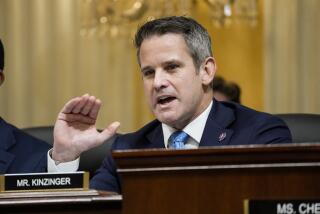To fund children’s health plan, House would pay insurers less
House Democrats would rely less on tobacco taxes than the Senate would and more on cuts to Medicare insurers to pay for a proposed $50-billion expansion of a children’s health insurance program.
The proposal, introduced late Tuesday, also would eliminate a 10% cut due next year in the reimbursement rate for doctors who treat Medicare patients. Instead, the legislation would give doctors a 0.5% increase in their reimbursement rates each of the next two years when they treat Medicare patients.
Democrats would pay for the expansion of the State Children’s Health Insurance Program, or SCHIP, through a 45-cent increase in the federal excise tax on a pack of cigarettes. They would also lower payments to many insurance plans participating in the Medicare Advantage program over four years.
The Senate proposes spending $35 billion more for SCHIP, and would pay for it by increasing the tax on a pack of cigarettes by 61 cents. That would push overall spending for SCHIP over the next five years to $60 billion.
President Bush has indicated he would veto the Senate bill. The White House has recommended a $5-billion increase in the program.
“If he wants to veto healthcare for kids, historians will deal with that,” said Rep. Pete Stark (D-Fremont).
The 10-year-old program subsidizes the cost of insuring children in families that earn too much to qualify for Medicaid but not enough to afford private insurance.
More than 6 million people, including about 600,000 adults, get health insurance coverage each year through SCHIP. The federal government pays for about 70% of the program, and the states pay the rest.
The House bill is more than 900 pages long and deals with much more than SCHIP. It would eliminate cost-sharing for preventive services in Medicare, such as cancer screenings. It reduces the co-payment on mental-health outpatient services from 50% to 20%.
The bill would also freeze reimbursement rates for some Medicare providers next year; namely, home health agencies, nursing homes and long-term-care hospitals. Such hospitals typically care for patients with complex needs who stay in the hospital more than 25 days.
It even takes on the new Medicare drug benefit. Now, Medicare recipients must have less than about $11,700 in assets to qualify for extra help in paying for their medicine. The House bill would increase that threshold to $17,000.
It also allows beneficiaries to change drug plans if the list of drugs covered changes during the course of the year. It would also allow coverage of benzodiazepines, a category of drugs often used in the treatment of anxiety disorders and insomnia.
The overall cost of the bill is about $90 billion over five years.
Republican leaders made it clear that they believed the proposed expansion of SCHIP was too large.
“It will continue to increase taxpayer-funded coverage for adults and middle-class children and move the United States toward a system of completely government-controlled healthcare,” said Rep. Jim McCrery of Louisiana, ranking Republican on the House Ways and Means Committee.
More to Read
Get the L.A. Times Politics newsletter
Deeply reported insights into legislation, politics and policy from Sacramento, Washington and beyond. In your inbox three times per week.
You may occasionally receive promotional content from the Los Angeles Times.






